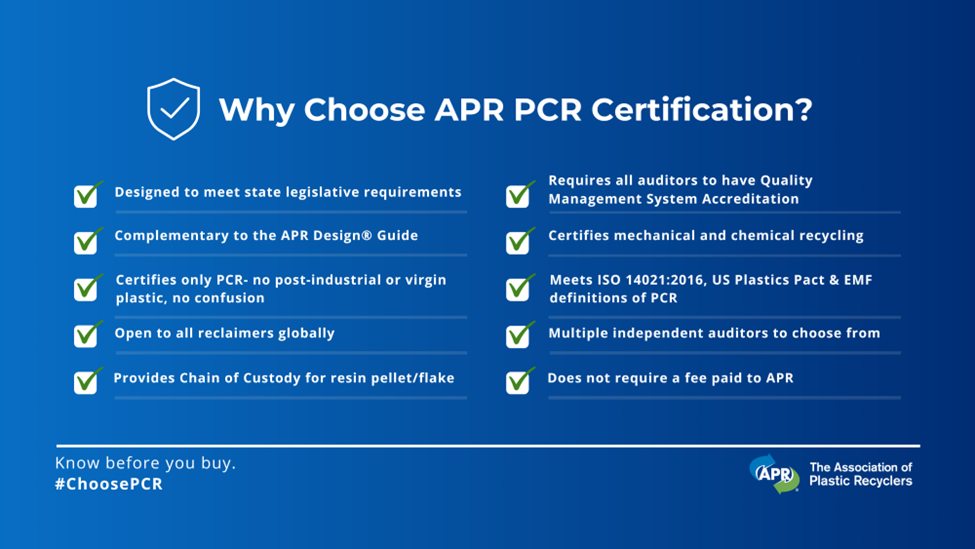
The Need: Postconsumer Resin (PCR), also known as Postconsumer Recycled Content, is plastic material that has met its intended use or can no longer be used for its intended purpose. It can be generated by households or by commercial, industrial, and institutional facilities in their role as end-users of the product. PCR is what most of us think about when we think of recycled plastic—turning a used plastic bottle into a new one, or turning used plastic bags into a park bench. One of the key tools for tackling the huge amount of plastic waste in our society, and turning the circular economy into a reality, is to support and stabilize the PCR market.
Brand companies and converters looking to fulfill publicly stated sustainability commitments rely on the certainty that the material they are purchasing and incorporating into their packaging is truly PCR. Unfortunately, along with the sharp rise in demand for recycled content, virgin and post-industrial plastics are being fraudulently sold as post-consumer recycled content (PCR). These materials that are marketed or sold as PCR under false pretenses dilute the impact of sustainability commitments, undermine the integrity of the recycling industry, and ultimately weaken trust in recycling as a solution to plastic waste.
The Solution: The APR’s PCR Certification Program provides that certainty. APR is continuing to grow its program to certify postconsumer (PCR) resin for use in packaging. APR PCR Certification is an important tool to provide transparency to those buying and selling recycled plastic, and to support a robust and stable market for recycled plastic that has met its intended use & would otherwise be headed to landfill or waste.
To create a circular demand pull that turns old plastic packaging into new recycled content, the industry must focus on strengthening the market for verified PCR.
Which of the Pact’s 4 Targets does your work help achieve? TARGET 4: By 2025, the average recycled content or responsibly sourced bio-based content in plastic packaging will be 30%
What makes it particularly smart or circular? APR PCR Certification provides transparency to support a reliable, robust PCR market and fosters trust at a critical juncture in the plastics packaging value chain. Any plastics reclaimer generating PCR pellet or flake can participate in this program to provide customer assurances in the authenticity of their product. Brand companies and converters can commit to using certified PCR to meet sustainability goals and prepare for upcoming regulations.
Results, Benefits, and Outcomes to Date: At the time of writing, 4 major certifiers have qualified for endorsement by APR to conduct certification audits, and 14 reclaimers offer APR certified post-consumer PET, HDPE, PP, LDPE, LLDPE, LLDR, and MDR resins. Buyers of PCR feel confident that the PCR they are buying is legitimately PCR, and reclaimers with legitimate PCR enjoy an expanded market for their certified PCR.
Quote: “The need for continued and growing demand for postconsumer recycled content is essential to the success of plastics recycling. We have seen virgin plastics being fraudulently sold as PCR,” said Steve Alexander, APR President & CEO. “Consumer Brand Companies looking to fulfill publicly stated sustainability commitments can feel confident that APR’s PCR Certification Program adheres to a clear, consistent definition of PCR. This program ensures that PCR receives the value it deserves.”